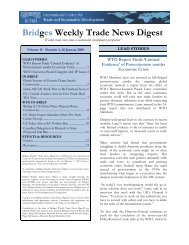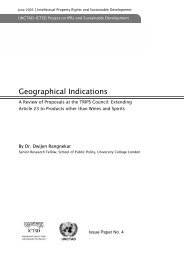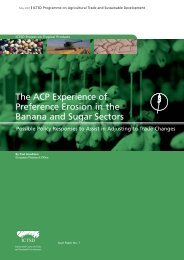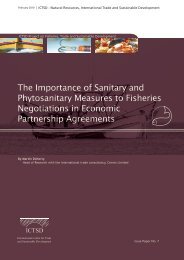Intellectual Property and Competition Law - IPRsonline.org
Intellectual Property and Competition Law - IPRsonline.org
Intellectual Property and Competition Law - IPRsonline.org
Create successful ePaper yourself
Turn your PDF publications into a flip-book with our unique Google optimized e-Paper software.
ICTSD Programme on IPRs <strong>and</strong> Sustainable Development15that claim the technology of others, or that areotherwise frivolous” (Sankaran, 2000).Sham petitioning may form the basis for a claimunder antitrust laws. Moreover, whether thepetitioning is a “sham” or not, no immunityprotects one who attempts to enforce apatent that is known to be invalid or procuredby inequitable conduct (Sankaran, 2000). InAustralia, legislation passed in implementing theFTA signed with the US provides for the impositionof penalties of up to 10 million Australian dollarson pharmaceutical patent holders that are foundto have filed frivolous suits to extend theirpatents <strong>and</strong> prevent generic copies of patenteddrugs from being marketed.The granting of a US patent is often invokedbefore smaller patent offices in developingcountries as evidence that the invention meetshigh patentability st<strong>and</strong>ards. The pro-patentapproach promoted by the US PTO has led manypatent offices to apply very loose criteria toestablish novelty <strong>and</strong> inventive steps, particularlyin the pharmaceutical field where patents aregranted in some cases with regard to, inter alia,pharmaceutical formulations 74 , combinations ofknown products 75 , optical isomers 76 , polymorphs 77 ,salts of known substances 78 <strong>and</strong> variants ofmanufacturing processes. Presenting drugs inslightly different ways to secure new patents <strong>and</strong>layering several patents on different aspects ofthe drug to secure perennial monopoly rights isone of the main ways that pharmaceutical firmsemploy to artificially extend the patent life oftheir drugs (Glasgow, 2001). 79 As a result, thereis a proliferation of pharmaceutical patents overa myriad of minor modifications (Correa, 2001),while the development of new chemical entitieshas drastically decreased since the 1990s. Suchentities account for a small fraction 80 of thethous<strong>and</strong>s of patents obtained every year aroundknown drugs, including those in the publicdomain.In view of the distortions caused by wronglygranted patents, the OECD has recommended amore active role for competition law enforcingagencies:“… to strive to limit the anti-competitiveaspects of IPR while respecting its necessity. Itappears that the wisest course of action for anagency wishing to influence IP policy is either tochallenge the validity of invalid or overly broadpatents through litigation or by requestingpatent re-examinations, or to open a dialoguewith the IP agency <strong>and</strong> take an advisory role (orboth)” (OECD, 2005, p. 16).Although the OECD suggests that “[F]or severalreasons, such as a lack of relevant technicalexpertise <strong>and</strong> limited resources, it does notappear to be prudent for competition authoritiesto assume responsibilities related to the initialreview of IP applications” (OECD, 2005, p. 7),the direct intervention of such authorities maybe contemplated where they may contribute toimprove the functioning of the IPR system.In the US, courts have considered that extendingpatent rights beyond the scope of the grantviolates the antitrust laws. 81 The FTC hasintervened in some cases of fraudulently obtainedpatents. In the 1960s it challenged agreementsbetween Pfizer <strong>and</strong> American Cyanamid relatingto tetracycline patents <strong>and</strong> ordered thecompulsory licensing of the patent in question ata fixed royalty. 82 Pfizer <strong>and</strong> American Cyanamidwere found to have made mis-representationsto <strong>and</strong> withheld essential information from thepatent examiner, thereby deceiving him intogranting a patent that otherwise would not havebeen approved (Azcuenaga, 1995).In a more recent case, the FTC also found <strong>and</strong>condemned practices aimed at deceiving the USpatent office to unduly obtain patent protection:“Through Bristol’s [Bristol-Myers SquibbCompany] decade-long pattern of alleged anticompetitiveacts, Bristol avoided competitionby abusing federal regulations in order to blockgeneric entry; deceived the US Patent <strong>and</strong>Trademark Office (PTO) to obtain unwarrantedpatent protection; paid a would-be generic rivalover USD 70 million not to bring any competingproducts to market; <strong>and</strong> filed baseless patentinfringement lawsuits to deter entry by generics”(FTC, 2003b) 83 .









